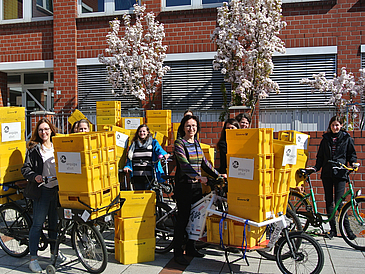“A survey of this magnitude is also something special for us,” says Professor Gabriele Bolte. She heads the project of the Department of Social Epidemiology at the Institute for Public Health and Nursing Research. The survey is part of a large-scale scientific initiative funded by the Federal Ministry of Education and Research with around 430,000 euros. The title is “Securing urban mobility of an ageing population,” abbreviated AFOOT (Alternd zu Fuß oder mit dem Fahrrad – urban mobil ohne Stress).
In focus: The Rural Area
“We are particularly interested in rural areas,” emphasizes Tanja Brüchert, a research assistant in the project. That’s why the big cities are excluded. All municipalities up to the size of a medium-sized town (up to a maximum of 99,000 inhabitants) come into question. “We want to know how mobile the interviewees really are, what hinders them in their living environment, or what motivates them to walk or cycle,” says Professor Bolte. The addressees can now have their say in the 28-page questionnaire. What is the condition of the cycle paths and sidewalks? Are there trash cans, benches, parking spaces for bicycles, and public drinking water dispensers? Are shops or service providers within walking distance? Those are some of the questions. “It is important for us to cover the entire spectrum,” Tanja Brüchert emphasizes. And she asks that older people who travel by car or public transport also complete the questionnaire.
What’s the Objective?
“The results of the survey give us indications as to which barriers need to be removed in public spaces, and which areas municipalities can focus on to promote active mobility in old age,” says Professor Gabriele Bolte. For a certain section of the population, it is about independence, social contacts, and active participation in everyday life. She is pleased that the participating communities are very open-minded about the survey and very interested in the results.
Approval by the State of Lower Saxony
The questionnaires will be sent to households from May 13. Addresses have been provided by the residents’ registration offices. This was preceded by a assessment by the project by the Ethics Committee of the University of Bremen. “In particular, it was about data protection, and that was rated positively,” says Gabriele Bolte. The Ministry of the Internal Affairs and Sport of the State of Lower Saxony also agreed to the survey because it serves the public interest.
The participating researchers emphasize that the data collected is evaluated anonymously. The results should then be available in spring 2020.
Further information:
http://www.aequipa.de/teilprojekte/afoot.html
Contact:
Tanja Brüchert
Institute for Public Health and Nursing Research (IPP)
University of Bremen
Tel.: +49 421 218-68960
E-mail: t.bruechert@uni-bremen.de
Institute for Public Health and Nursing Research (IPP) at the University of Bremen is one of the largest research institutes in this field in Germany. The central goal of the research and teaching is to improve the health and well-being of the population. IPP was founded in 2005 as a research institution of the Human and Health Sciences faculty. Today, more than 60 scientists research and teach in nine departments and working groups. The strengths of the IPP include interdisciplinary health and nursing research, research-oriented teaching in health and nursing science degree courses, and knowledge transfer in practice, politics, and society.
http://www.ipp.uni-bremen.de

